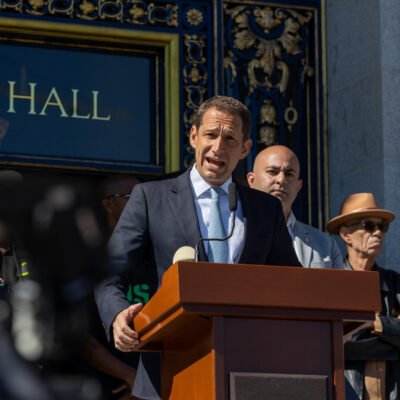Conor here: Thomas Neuburger in the following piece focuses on the scourge of lobbyists in DC. Zoom out a little, and I think what he’s getting at is the two-tiered justice system for the economic elite and the rest of us. Powerful lobbyists crafting legislation that benefit the ruling class seems to me a symptom of the wider problem of an entire social system geared around exploitation and the worship of money. And with capital prioritized over all else, we’re getting radical change (albeit not the type Neuburger calls for) with increasingly undemocratic systems everywhere—from the workplace to the university to all levels of government.
One silver lining to the Trump Accelerationists moving fast and breaking things is that when the deregulated casino crashes and burns, it might leave a small opening for the type of radical change Neuburger is calling for—and preferably a lot more than just getting rid of lobbyists— as long as people don’t get hoodwinked by “hope and change” again.
By Thomas Neuburger. Originally published at God’s Spies.
Today is throwback day. On the theme of amending the Constitution without passing amendments, I offer the piece below. I wrote it in 2015, when the world was young and Russians were not irredeemably evil (see Mission: Impossible — Ghost Protocol or X Men: First Class), and Sanders, we thought, might do what Obama wouldn’t.
It leans on a Time magazine piece by Gary Hart, a Democratic politician to the left of 1980s centrists. Hart ran for president in the 1988 contest but was felled by a scandal involving an affair. (The not-so-young may recall Donna Rice. By the way, it looks like Hart was set up, by no less than the infamous Lee Atwater. See this account of an Atwater deathbed confession involving Hart.) In the piece Hart contends that lobbying has become “the fourth branch of government and uses data from 2014 (updated below).
But Hart also raises a larger point — What is corruption? That question is the reason I wrote the original piece. In it I also attempted to tackle a solution to U.S corruption. Turns out our answer is the same one Hercules chose — Noah’s flood. I still think that’s the best fix, and that some alive will be seeing it. Not completely good news.
Below is the piece I wrote then, cut down and lightly edited. It was originally published at Howie Klein’s Down With Tyranny. Enjoy.
***

But first, two definitions. The Augean Stables is a reference to the Fifth Labor of Hercules, one of the Twelve (click to read the context). The task was to clean the king’s stables, which housed 1,000 cattle and which hadn’t been cleaned in 30 years, the life of the man who owned it. Cleaned of what? Surely you know:
[T]he livestock were divinely healthy (immortal) and therefore produced an enormous quantity of dung. These stables had not been cleaned in over 30 years, and over 1,000 cattle lived there. However, Heracles succeeded by rerouting the rivers Alpheus and Peneus to wash out the filth.
The second definition — corruption. Most think of corruption as an outcome that’s perverted for the sake of money. Hart correctly says, not so:
From Plato and Aristotle forward, corruption was meant to describe actions and decisions that put a narrow, special, or personal interest ahead of the interest of the public or commonwealth. Corruption did not have to stoop to money under the table, vote buying, or even renting out the Lincoln bedroom. In the governing of a republic, corruption was self-interest placed above the interest of all—the public interest.
Corruption is “self-interest placed above the interest of all,” or in some cases, one’s legal or contractual obligation. [Hart’s work comes a year after Zephyr Teachout wrote her book on the subject, reaching the same idea.]
Thus, for example, some college football referees and refereeing groups are obviously corrupt. When Conference A plays Conference B using Conference B’s referees, and year after year the bad calls go Conference B’s way, especially with the game on the line, the referees are corrupt.
Are they betraying their obligation for money? Likely not. Are they betraying their obligation in order to satisfy animus against Conference A, or to make sure the “home teams” win? That’s an obvious explanation, and by his definition (and mine), that’s indeed corrupt.
Or take another situation. By this definition, the Supreme Court since at least 2000 and likely before has acted corruptly, if the definition is “self-interest placed above the interest of all.” No legal analysis of Bush v. Gore passes the “upholds the interest of all” test — the Republicans on the Court simply put a Republican (the home team candidate) in the White House because they could. Nor do their major decisions around money and corporate rights, like Citizens United or Buckley v. Valeo, the 1976 Burger Court decision that lifted restrictions on campaign contributions, and its follow-up, First National Bank of Boston vs. Bellotti, whose majority opinion was authored by Lewis Powell, of the infamous Powell memo.
By this definition — perverting an outcome to benefit a group in which one has a personal interest — the Supreme Court could be thought to have acted corruptly in each case mentioned above. It was likely corrupt in Buckley, Citizens United, and First National Bank of Boston, and certainly corrupt in Bush v. Gore, where Republican justices favored a Republican candidate for president over a Democratic one on no defensible grounds.
The Court wasn’t metaphorically “corrupt.” It was corrupt by definition.
The Systemic Corruption of the U.S. Government
Hart’s piece is an interesting Time magazine essay, and also a long section from his new book, The Republic of Conscience (I don’t support Amazon, so no Amazon link). I don’t want to quote a ton of it, since its main argument is likely familiar to you. But he makes a systemic point in a way that seems original; that is, he puts pieces together to make a bigger whole than most of us were aware of. For example, it’s likely that the “army of lobbyists” we all hate aren’t a perversion of government — they are government.
A few notable sections (all emphasis mine):
From Plato and Aristotle forward, corruption was meant to describe actions and decisions that put a narrow, special, or personal interest ahead of the interest of the public or commonwealth. Corruption did not have to stoop to money under the table, vote buying, or even renting out the Lincoln bedroom. In the governing of a republic, corruption was self-interest placed above the interest of all—the public interest.
By that standard, can anyone seriously doubt that our republic, our government, is corrupt? There have been Teapot Domes and financial scandals of one kind or another throughout our nation’s history. There has never been a time, however, when the government of the United States was so perversely and systematically dedicated to special interests, earmarks, side deals, log-rolling, vote-trading, and sweetheart deals of one kind or another.
What brought us to this? A sinister system combining staggering campaign costs, political contributions, political action committees, special interest payments for access, and, most of all, the rise of the lobbying class.
Worst of all, the army of lobbyists that started relatively small in the mid-twentieth century has now grown to big battalions of law firms and lobbying firms of the right, left, and an amalgam of both. And that gargantuan, if not reptilian, industry now takes on board former members of the House and the Senate and their personal and committee staffs. And they are all getting fabulously rich.
Gargantuan numbers of lobbyists with gargantuan amounts of money — there’s a point where corruption of government on that scale systemically changes government itself.
A Fourth Branch of Government
For Hart, the movement of office-holders and their staffs between lobbying firms and government is not a “revolving door” to government; that revolving door is government. Hart makes his point by looking at the lobbying firm WPP, the largest of three giant lobbying conglomerates. WPP isn’t just a lobbying firm, it’s an international conglomerate of firms that wields enormous power and wealth. When one lobbying firm has billings of nearly $75 billion, you can “buy committees,” not just individual votes; and you can “set agendas” rather than just pass laws.
[Recent numbers: According to Open Secrets, $4.4 billion was spent on lobbying in 2024, another new high. There are 525 members of Congress. That’s over 8 million each, and it doesn’t count additional spending to defeat opponents. AIPAC alone spent over $100 million defeating candidates in 2024; this isn’t counted as lobbying.]
Now consider that “revolving door” again. Is that a door out of government and back into it, or is it a door that leads to another branch of government, one where policy decisions also get made?
The Other Way to Amend the Constitution
All constitutions and all systems of laws are amended in two way, by formal agreement (legal process) and by informal agreement. In England, the second ways is in fact the primary way their “constitution“ is amended.
In the U.S., if both parties enforce a law in the same way, even though that way deviates from the way the law is written, the law is amended until forced back to its original form in practice. Thus:
▪ We have, by bipartisan agreement, revoked the Fourth Amendment. Neither party enforces it, so it’s gone. Do you think you’ll see it enforced in your lifetime? It’s possible. Is that likely, do you think, without another radical change?
▪ We have changed the “rule of law” to add a “circle of immunity” amendment. It started with Nixon — the circle of “who cannot be prosecuted” included one person, the president. That was created by Gerald Ford’s pardon — which was corrupt; it got Ford the presidency — and later confirmed by Obama, who refused to indict Bush II for violating laws against torture. (Further to this, can you see Obama being indicted by anyone for extrajudicial murder, assassination really, of Americans, some of whom were mere propagandists and others completely innocent?)
Under Reagan–Bush I that circle expanded to include their top cabinet officers, like Defense Secretary Casper Weinberger. Under Bush II–Obama it widened again to include all money-center bankers and former senators (and outright crooks) like Jon Corzine.
▪ Regarding that comment about Obama and his drone kills above, we’ve now amended the trial-by-jury section of the Sixth Amendment to allow executive assassination, death by executive fiat. It just awaits a Republican president to confirm it by following suit, but Congress has already approved.
And so on. Now we can add one more non-amendment amendment:
▪ The mega-lobbying firms are a fourth branch of government. Policy is set in these firms and passed to Congress and the executive branch to “discuss.” Once discussed and passed, those who passed these policies return to the firms to set more policy — and receive what’s often the biggest payoff of their lives.
Was TPP [Trans-Pacific Partnership, Obama’s NAFTA of the Pacific] drafted first in these mega-firms before being negotiated between nations? There aren’t many other reasons to get 600 lobbyists (pdf) to meet.
Cleaning the Augean Stables
Back to Hart’s essay and where we started, with the Augean Stables. The way out of this mess, if Greek myth is any indicator, is not incremental. You can’t shovel your way out. Remember, that’s a 1,000-cattle stable, and in our case a literal army of lobbyists. With a mere shovel, we’d be buried to our necks before the fourth toss of filth out the window.
How did Hercules clean his stable? He diverted two rivers and ran the whole mess out to sea. There’s a word for that equivalent today — radical change — going to the root of the problem. As then, so now.






